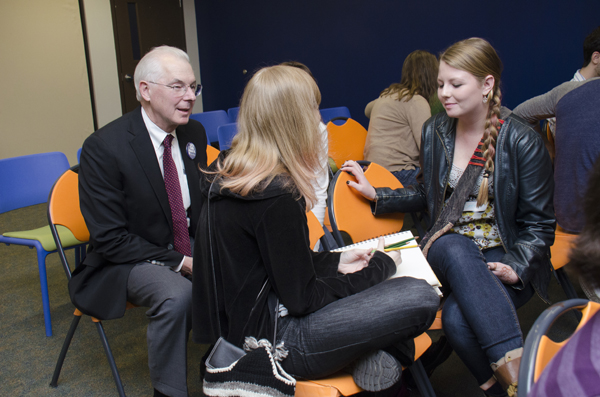

The “Let’s Talk About Race, Gender, and Identity” Symposium held Saturday, Nov. 16 brought around 300 students together to bring up topics aimed at open discussions.
Student Association (SA) President Manuel Tejada served as MC of the event, while Associate Professor of Black Studies, Karanja Keita Carroll and SUNY New Paltz President, Donald Christian provided opening remarks.
Christian began by acknowledging the work done by Tejada and his colleagues in planning and organizing the symposium and quickly addressed the recent racist slurs found in residence halls.
“I think we’re all aware of the recent racial postings and writings on this campus,” Christian said. “These are examples of the kinds of offensive, obnoxious, ignorant and hateful speech that occurs on college campuses all across this country.”
Christian said an example of New Paltz’s efforts to strive towards diversity, equity and inclusiveness is the new non-discrimination policies recently implemented to include gender identity.
But he said more still needs to be done.
“Policy or structure will not prevent the kinds of speech or writing that has caught our attention most recently,” he said. “One of the most powerful responses to such speech is more speech — instructive, thoughtful, respectful speech that unifies rather than divides us. Letting the utterances of one person armed with a felt tip marker divide us, or harm our community, yields immense power to evil or ignorance and I don’t believe any of us wants to give the perpetrator of these acts such satisfaction.”
Three workshops followed opening remarks. Desiree Burch, a New York-based performer, writer and producer, and J Mase III, a transgender poet and activist led the breakout sessions. Actor Michael Fowlin served as the keynote speaker.
The symposium concluded with small facilitated discussion groups.
Second-year public relations major Luisanna Sosa said she thought the speakers were very enlightening.
“I enjoyed the different ways the presenters tackled each theme,” she said. “They all had their unique style that made me feel engaged.”
Sosa said the event showed that the administration, faculty and students care about coming together when incidents of racial intolerance occur.
Although Sosa said she thought the event was successful in delivering the message to educate students and to spread knowledge learned at the event to peers, she said she would have liked to see the presence of more faculty at the symposium.
However, in an email sent out after the event by Christian, he said he was “very proud of the student, faculty and administrative participation and commitment to such a critical discussion.”
Third-year fine arts major Cloe Grozis agreed that the event was overall very good, but questioned certain speakers techniques.
Fowlin acted out a scene as if he were a man with cerebral palsy, and told a “life story” from that person’s point of view, Grozis said.
“[At] our discussion group at the end, [we] talked about whether it was okay for the last speaker [Fowlin] to portray different groups like he did, especially [portraying] someone with cerebral palsy,” Grozis said. “He meant well and I think it had a good impact, but I know a lot of people had issue with it from a moral standpoint.”
Stephanie Pina, a fourth-year Spanish major, said she enjoyed the workshops she attended.
“I’ve been to a lot of lectures on LGBTQ issues so that’s why I enjoyed [J Mas III],” Pina said. “The second workshop [Burch] was great because she made us open our eyes to how we see ourselves and how we judge others.”
Christian said healing as a community will continue to take time. However, in order to combat hateful speech, he asks in his email for every member of the community to write a hopeful, positive or unifying message to be displayed on their residence and office doors.
“Let these words set the tone for our community and serve as the roadmap to our next steps,” he said.
The college is planning another symposium on race, gender and identity to be held in the spring semester.
